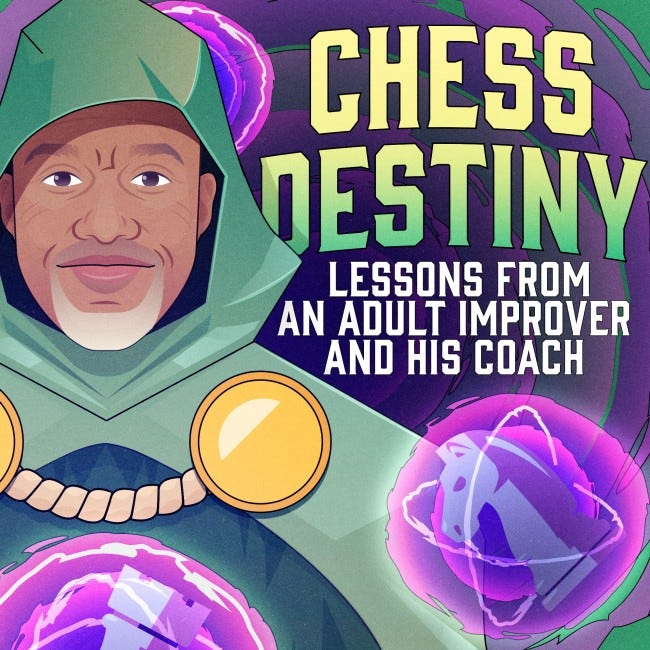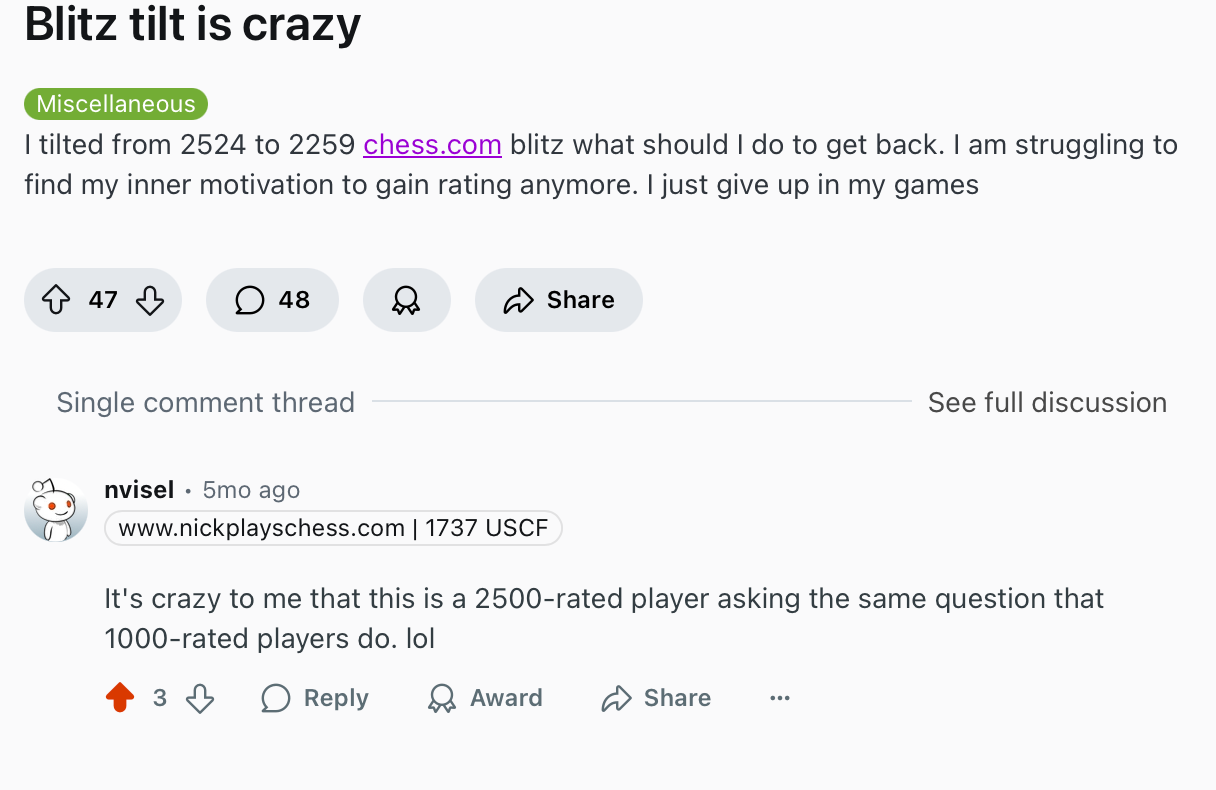Chessable Course Review: Chess Destiny: Lessons from an Adult Improver and his Coach by Omar Mills (aka ChessVonDoom)
Conversational Chess Therapy For Chess Players Stuck Below 1200.
Thanks to Omar for the review copy of this course.
Anybody who had the pleasure of enjoying the microcosm of the #chesspunks community on Twitter has probably heard of Omar Mills before, most likely by his username ChessVonDoom. Omar’s chess career has been less-than-glamorous: He started out thinking he’d become a master and announced his intentions online, and was eventually faced with the fact that chess is hard, actually, and began the grind not to 2200, but to 1200. In fact, recently Omar has hit this rating goal online and maintained it lately, maybe three years into his chess journey.
In other words, he’s the kind of chess player most people will be able to relate to. And that’s why his course, Chess Destiny: Lessons from an Adult Improver and his Coach is such a unique delight.
I do not usually believe in purchasing video courses on Chessable (because I am not a visual learner). However, I do feel that for most people, this is the exact way one should digest this particular course. Why? Because Omar’s presence and story-telling ability is best-experienced aurally, and video grants you access to hear Omar talk you through things.
Omar’s got one of those radio voices (and deservedly has starred on many chess-related podcasts, including Chess Journeys, Chessfeels, The Chess Experience, and most recently the Perpetual Chess Podcast), but he matches it with a sort of honest wisdom that is clearly gained from his own struggles, so he never comes off as a salesman trying to convert you to his wares. He’s a genuine, down-to-earth guy, and if you’re like him, trying to reach the “default” rating level of 1200 on chess.com, and you’ve hit a plateau or two on the way over the past few years, Omar probably will have a way of making you feel absolutely seen.
Chess Destiny is squarely in the market for beginners. The point of the course isn’t to produce the most accurate play or the best understanding of the game; rather, it’s about dealing with the struggle of trying to get better at the venerable game. Omar dispenses much advice about improvement (and it’s advice we’ve heard before), but he also talks about the games he goes through (a mixture of master games, his own games, and some of his friends’ games [including one of mine, I should add]) — specifically about building up your mental strength to play better chess. It’s not about the theory per se, more just about thought process and practical lessons learned over time, especially from his own tournament games. It’s the closest most of us will get to being in the room and hanging out with Omar and talking chess shop, which is the sort of thing a player rated under-1200 (and for the record, that’s the majority of chess players) could probably benefit from quite a bit.
Apart from Omar, we also get input from his coach, NM Robert Ramirez, who provides another level of commentary, particularly in certain tactical or positional situations. However, crucially, the spotlight is on Omar’s perspective, which is where it should be for material like this.
The chapter titles should give you an idea of the lessons Omar learned and is now sharing:
Find Your Why - What are your aspirations?
Find Your Hero - Who are your inspirations? (e.g. whose model games might you want to follow?)
The Rule of 3 - “Adults generally have to fail at something at least 3 times before they believe and pivot.” — in other words, we often ignore advice at first, but can learn if we push through this painful tendency
Adult Improvement: The Mental Game - Talking about mindset during the game.
Adult Improvement: Playing Good Moves - (self-explanatory)
The Adult Study Plan - (also self-explanatory)
The Coach - A brief expose on Robert Ramirez and his students (including Omar)
Bonus: Taking Souls - Omar takes the last chapter to show a few of his wins as he turns the tables on his opponents.
Overall, the variation count is light, but the length of the video course is about 10 hours and goes beyond the written material. Omar is conversational, funny, and manages to sound un-scripted in the best possible way. He talks about his life experience in other ways and how those have applied to chess and vice versa. Crucially, he takes time to focus on a particular aspect of chess improvement that a lot of players including himself have struggled with: defeating negative self-talk. Omar has a sort of self-effacing style when it comes to talking about how others play chess. His infectious enthusiasm for the game is unsurprising if you follow him online, but so much more immediate when you’re watching him on video. The whole course is a delight to play through and watch.
Admittedly, I’m not a member of the target audience and thus the analysis isn’t as deep as would benefit someone at my skill level. However, it doesn’t matter if you’re 1200 or 2200; it is very easy to feel inadequate as a chess player and most players, at one point or another, have become depressed or demotivated by their own struggles whether over the board or internally:
And so there is even something here for that player looking for a bit of encouragement, a bit of extra heat for their flickering wick, who needs to be reminded that they can play chess well and that, yes, it’s hard, but it’s also worth it. And that’s the real triumph of Chess Destiny. It teaches, or reminds, of the appreciation of the game that is necessary to keep playing and trying to become stronger. It doesn’t matter if you’re rated 1200 or 2200 in that respect — there are lessons that most people need to learn, and Omar seems to have learned many of those — and he wants to share them with the world. I’m very thankful for that.
Omar has stated many times that while he might not become a GM in chess, he aspires to be a GM at life. And as the video course continues to show, I think he is on to something.



